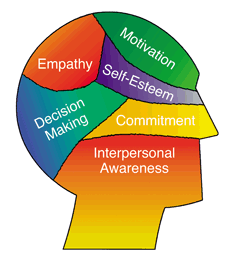Soft Skills. You’ve heard the phrase, but turning it into something meaningful and straightforward, something that impacts your day-to-day interactions with children, is another matter.
Soft skills, sometimes called emotional intelligence or social-emotional learning, is a catch-all phrase for the kinds of non-academic skills that are linked to success in school and in life. It includes skills such as self-awareness, patience, communication skills, respect for self and others, planning, conflict resolution skills, and many more. This post is first in a series of tips for people who work with children and youth, starting with …
Delayed Gratification
W hat is it?
hat is it?
Delayed gratification is our ability to recognize that, while we might get a little bit of pleasure or delight out of doing something now, we will get a bigger reward out of holding off. This skill is useful for everything from choosing a good behavior in a classroom, to self-motivation when getting through an unpleasant task. It’s also been shown that a strong ability to delay our gratification reduces the risk of substance abuse and addiction.
How does it work?
We delay gratification whenever we decide to wait and not do something we want to do. It ties in closely with impulse control. Watch this adorable video to see an example of delayed gratification.
How do you build it?
Try these easy ways to build children’s ability to delay gratification:
- Present them with choices like the one in the Marshmallow Test — a small reward now or a big reward if they can meet a challenge. For instance: “you can tell me your joke now, or if you can focus on reading for the next 15 minutes, you can tell your joke to the whole group!” (NOTE: in this example, make sure the joke is appropriate!)
- Use this frame to discuss behavioral choices. For instance: “I understand why whispering to Pete is fun right now, but if you wait until an appropriate time to talk to Pete, then you’ll get to join us for coloring time instead of being in time out.”
- Help children develop self-motivational reward systems. For instance, “I know that cleaning up is hard for you. Is there something nice you can do for yourself as a reward if you do a good job and finish cleanup on time?”
- Do it as a group. For instance, “lining up and getting on the bus in a quiet and orderly fashion is tough, and it’s fun to act up. But if we can all help one another be appropriate, I’ve brought a super fun bus game that has to do with super heroes. So let’s try to be appropriate now so we can play a fun game once we’re all on the bus!”
How do you help kids learn how to delay gratification? Leave a comment below and let’s start a conversation!
Want to know more about how to build soft skills with the kids in your after school or summer program? Strengthening social/emotional skills is one of the focus areas for the Connecticut After School Network. Connect with us on our website, through this series of blog posts, or call us to schedule an on-site training on soft skills in your program. Call or email Sue at 203-483-1846 or skrampitz@ctafterschoolnetwork.org.

